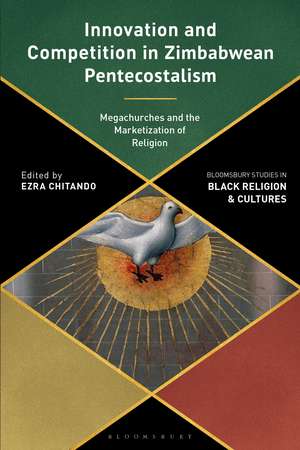Innovation and Competition in Zimbabwean Pentecostalism: Megachurches and the Marketization of Religion: Bloomsbury Studies in Black Religion and Cultures
Editat de Ezra Chitandoen Limba Engleză Paperback – 24 aug 2022
| Toate formatele și edițiile | Preț | Express |
|---|---|---|
| Paperback (1) | 198.22 lei 6-8 săpt. | |
| Bloomsbury Publishing – 24 aug 2022 | 198.22 lei 6-8 săpt. | |
| Hardback (1) | 569.45 lei 6-8 săpt. | |
| Bloomsbury Publishing – 10 feb 2021 | 569.45 lei 6-8 săpt. |
Preț: 198.22 lei
Preț vechi: 258.12 lei
-23% Nou
Puncte Express: 297
Preț estimativ în valută:
37.93€ • 39.60$ • 31.32£
37.93€ • 39.60$ • 31.32£
Carte tipărită la comandă
Livrare economică 15-29 aprilie
Preluare comenzi: 021 569.72.76
Specificații
ISBN-13: 9781350213272
ISBN-10: 1350213276
Pagini: 256
Ilustrații: 10 bw illus
Dimensiuni: 156 x 234 mm
Greutate: 0.36 kg
Editura: Bloomsbury Publishing
Colecția Bloomsbury Academic
Seria Bloomsbury Studies in Black Religion and Cultures
Locul publicării:London, United Kingdom
ISBN-10: 1350213276
Pagini: 256
Ilustrații: 10 bw illus
Dimensiuni: 156 x 234 mm
Greutate: 0.36 kg
Editura: Bloomsbury Publishing
Colecția Bloomsbury Academic
Seria Bloomsbury Studies in Black Religion and Cultures
Locul publicării:London, United Kingdom
Caracteristici
Provides detailed descriptions of innovation in two of the leading Prophetic Pentecostal Churches in Zimbabwe
Notă biografică
Ezra Chitando is Professor of History and Phenomenology of Religion at the University of Zimbabwe, and Theology Consultant on HIV and AIDS for the World Council of Churches.
Cuprins
Introduction: Innovation and Competition in Zimbabwean Pentecostalism 1. Pentecostalism in Zimbabwe and the Re-vitalization of African Traditional Religions: a comparative analysis of the newer religious movements, Kudzai Biri (University of Zimbabwe)2. Miracles, Muti and Magic: An inquiry into the analogous nature of Pentecostal miracles and African traditional beliefs, Obert Bernard Mlambo and Clive Tendai Zimunya (University of Zimbabwe) 3. The Devil is on Fire: Analysing Pentecostalism as a place of refuge amidst economic and political turmoil in Zimbabwe in the decade, 2000 - 2010, Lovemore Ndlovu (Independent scholar)4. Pentecostal Prophets Emmanuel Makandiwa and Walter Magaya: masculinity, competition and the postcolonial state in Zimbabwe, Ezra Chitando (University of Zimbabwe)5. Religion in a new era: pentecostalism and innovation in prophetic healing and deliverance ministries in Zimbabwe, Tabona Shoko (University of Zimbabwe)6. Re-branding Pentecostalism: an analysis of the United Family International Church and Prophetic Healing Deliverance Church, Molly Manyonganise (Zimbabwe Open University, Zimbabwe)7. Survival of the Fittest! A comparative analysis of United Family International Church and Prophetic and Healing Deliverance Ministries, Fungai Chirongoma (University of Cape Town, South Africa)8. Old Wine in new Wine Skins: Continuities and discontinuities of African traditional anthropological beliefs in DiVineyard Church of His Presence, Fortune Sibanda (Great Zimbabwe University)9. Competition and Complementarity in Newer Zimbabwean Pentecostal Ministries, Tenson Muyambo (Ezekiel Guti University, Zimbabwe)10. The quest for unique identity in the prophetic ministry in Harare: the case of prophetic healing and deliverance ministry, Martin Mujinga (United Theological College, Zimbabwe)11. "Serve God Full Time and Overtime": Pentecostalism in Zimbabwe and the re-configuration of the Gospel of Prosperity, Kudzai Biri (University of Zimbabwe)12.Older and Newer Zimbabwean Pentecostal Churches' Focus on the Prosperity Gospel: A Comparative Analysis, Phillip Musoni (University of South Africa, South Africa)13. At the Mercy of 'the Man of God'? Sexual and gender based violence (SGBV) in Pentecostalism in Zimbabwe, Tapiwa P. Mapuranga ( University of Zimbabwe)14. Lampooning Prophetic Pentecostal Christianity in Zimbabwe: The case of bus stop TV, Ezra Chitando and Kelvin Chikonzo (University of Zimbabwe)ConclusionBibliographyIndex
Recenzii
[T]his volume successfully demonstrates that ATR with its many manifestations of the spirit, lives on in contemporary and modern Zimbabwean society via the Pentecostal phenomena.
This book offers an intriguing, often scandalous account of competition among Pentecostal leaders in Zimbabwe through analyses that successfully call attention to healing as a constant felt need in contexts where health systems have been severally compromised.
This book offers an intriguing, often scandalous account of competition among Pentecostal leaders in Zimbabwe through analyses that successfully call attention to healing as a constant felt need in contexts where health systems have been severally compromised.










